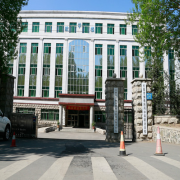经济危机英语 经济危机中国的十大措施
来源:择校网 时间:2025-03-25 16:45
一、找关于经济危机的英语文章,谢谢!
既有英文还有中文翻译。
比如
经济收缩美国大力出资刺激借贷
US Government Acts to Spur Lending Amid Economic Downturn
经济收缩美国大力出资刺激借贷
The U.S. economy has contracted more sharply than previously believed, according to new government figures. Meanwhile, in yet another sign of continuing stress in the credit market, the U.S. central bank is allocating hundreds of billion of additional dollars to purchase bad mortgage debt and spur consumer lending.
美国政府公布的最新统计数字显示,美国经济今年第三季度的收缩幅度远远大於先前的估计。与此同时,为了缓和信贷市场持续不断的压力,美国的中央银行正在拿出数千亿美元收购房贷坏帐和刺激消费者借贷。
Revised figures from the Commerce Department show the American economy shrank at an annual rate of 0.5 percent in the third quarter of the year, a greater contraction than the original estimate of 0.3 percent. The negative quarter followed a year of mostly-anemic growth, and, while the fourth quarter has yet to be completed, economists believe it, too, will show significant contraction.
根据美国商务部发布的经过修正的数据,美国经济在今年第三季度折合成年率收缩了0.5%,远远大於先前估计的0.3%。在此之前,美国经济增长已经持续疲软了一年。今年第四季度虽然尚未结束,但是经济学家相信,美国经济在今年最后三个月也将是大幅度收缩。
"GDP [gross domestic product] fell by 0.5 percent because consumers spent less, there were fewer new homes built, and expenditures for business purposes fell," said. University of Maryland economist Peter Morici."Unfortunately, this is a precursor of worse things to come."
马里兰大学的经济学教授彼得·莫里奇(Peter Morici)说:“国内生产总值(GDP)下降了0.5%是因为消费者花销减少、新房子修建太少、用于商业目的的开销下滑。不幸的是,这些还只是即将来临的更糟糕的情况的前奏。”
Most analysts trace America's current economic woes to tight credit conditions sparked by a wave of home foreclosures and mortgage defaults. In recent weeks, the U.S. government has taken a series of aggressive, unprecedented steps to prop up or take control of major lending institutions and financial firms, committing well over$2 trillion to the effort.
绝大多数分析人士都把美国目前的经济困难归咎于房贷违约和丧失抵押住房赎回权案子激增所导致的信贷条件紧缩。最近几周来,美国政府采取了一系列前所未有的大刀阔斧行动来支持或接管主要的信贷机构和金融公司,承诺拿出的资金总额已经超过两万亿美元。
Now, the Federal Reserve says it will devote an additional$600 billion to combat the mortgage meltdown, and another$200 billion to unfreeze consumer credit. A small portion of the new funds will come from a$700 billion rescue package Congress approved last month, which is being administered by the Treasury Department.
现在,美国联邦储备委员会又说,将再拿出6000亿美元来抵御房贷市场的下滑,另外还要拿出2000亿美元来帮助消费者信贷市场解冻。在这笔新的救市基金中,有一小部分来自国会上个月批准的7000亿美元金融救援计划。美国财政部负责管理这些金融救援资金。
"By providing liquidity to issuers of consumer asset-backed paper [consumer loans], the Federal Reserve facility will enable a broad range of institutions to step up their lending, enabling borrowers to have access to lower-cost consumer finance and small business loans," said Treasury Secretary Henry Paulson."Today's announcement by the Fed underscores our support for the housing market. Nothing is more important to getting through this housing correction than the availability of affordable mortgage finance."
财政部长保尔森说:“通过向消费者贷款发放部门提供流动性,美联储就可以帮助各种各样的机构增加借贷,并且使借款人能够获得成本较低的消费者贷款和小企业贷款。为了渡过这次房地产市场的修正期,没有什么事情比提供人们能够负担得起的房贷融资更加重要了。”
Few, if any economists would contest the importance of the availability of credit to the health of the American economy, nor the desirability of the federal government doing all it can to reverse a credit crunch that has constrained businesses and consumers alike.
说到信贷市场对于美国经济健康的重要性,几乎没有任何经济学家持反对意见。他们也都赞同联邦政府竭尽全力扭转信贷紧缩的局面,因为信贷紧缩使工商企业和消费者同时受到制约。
But the sheer scale of initiatives undertaken to date, and the apparent need for successive waves of government intervention are an unsettling indication of the magnitude and the tenacity of the problem being confronted, according to economics professor Lawrence White of the University of Missouri.
然而联邦政府迄今为止所采取的这些规模空前的计划,以及一波接一波迫切需要政府干预的浪潮,令人不安地显示出目前问题是多么的巨大和艰难。密苏里大学的经济学教授劳伦斯·怀特说:
"It is a recognition [that] we still have a big problem. It is a strong statement by the Fed that it is going to take massive, broad, forceful efforts to try to break the back of [resolve] the crisis," he said.
“大家都认识到我们仍然面临一个很大的问题。美联储的行动已经强有力地说明,我们需要采取大规模的、广泛的、强有力的努力来破解这场危机。”
In the face of relentlessly grim economic news, Treasury Secretary Paulson says the federal government is doing all it can to mitigate the situation.
面对这些滚滚而来的冷酷无情的经济新闻,美国财政部长保尔森表示,联邦政府将尽一切努力来缓和目前的形势。
"It will take time to work through the difficulties in our market and our economy, and new challenges will continue to arise. I and my regulatory colleagues are committed to using all the tools at our disposal to preserve the strength of our financial institutions and stabilize our financial markets to minimize the spill-over [damage] into the rest of the economy," he said.
“我们需要时间来克服我们的市场和我们的经济中存在的困难,而且新的挑战还会继续出现。我和其他负责监管的同仁们决心利用一切可以利用的手段来确保我们金融机构的实力,稳定我们的金融市场,尽量减少其他经济领域受到的损失。”
In other economic news, a private research firm says U.S. consumer confidence has rebounded somewhat this month, aided by falling energy prices, but that the index remains at a low level. Meanwhile, U.S. export growth slowed, while American homebuilders continue to cut spending.
总部设在纽约的经济研究机构会议委员会报告说,美国的消费者信心在11月份出人意料地有所提高,主要由于能源价格下降,不过消费者信心指数仍然处于很低的水平。另外,美国的出口增长有所减缓,美国的住宅建筑商继续削减开支。
二、求有关经济危机的英语作文
What is the reason for the US economic crisis?
The Mortgage problem is the result of corporate greed run amuck. And the damage caused in the'90s by changing banking regualtions is small change compared to the fleecing of the middle class with the tax code. That's why they can't pay a mortgage.
See: How has the Income Tax contributed to the economic crisis of 2008?
and: What is the main cause of the current economic crisis in the US?
Answer:
Basically what happened is that in the late 1990s the Republican Congress did away with a lot of regulations in the financial industry that had been put in place in the 1930s during the Great Depression. Without these regulations, it became easier for a lot of questionable banking and lending practices to take place. Lenders started making money by giving out mortgages to people they knew or should have known could not actually afford the houses they were buying; the lenders assumed that housing prices would continue to rise, so in the case of foreclosure the lender would still make money.
Millions of people ended up in these kinds of mortgages, called subprime mortgages; knowingly or not, these people ended up not being able to repay their mortgages. At the same time, housing prices started to fall. So imagine this: you buy a$500,000 house with mortgage of$475,000 and a down payment of$25,000. With the initial interest rate, your mortgage payment each month was only$400. But then interest rates rose(and these people had mortgages with adjustable, instead of fixed, rates on them), and so your payments went up to$600 or$800. The problem is you don't have enough income to pay that each month, so you can't afford to make your mortgage payments. Meanwhile, the value of your house falls to$400,000. That means that, even if you sell your house, you will still owe the$100,000 difference. The result of this is that people in this situation go bankrupt, and the lender ends up owning the house.
This problem has happened millions of times in the U.S. but also in other countries where the same lax practices were taking place, e.g. Spain, Canada, the U.K., etc.
Answer
Lenders that gave out too many mortgages of this type then found themselves having a lot of people not be able to pay back their mortgages. The lender then ends up with the foreclosed house, but it can't sell the house for very much because housing prices are falling. This means that the lender has lost a LOT of money on the one house. If banks loose$200,000 on a million homes, that's already$2 billion in lost money.
This is all simplified, of course.
Answer
The other problem is that these mortgages were being bundled into investment opportunities that companies like Lehman Brothers and other companies then sold shares in to investors. All these people are now also loosing their money.
The results are that bank in trouble don't have enough assets to stay in business; the problem is so massive that only government bail-outs can keep the banks in business. Because so many banks have so many bad mortgages, which are a kind of loan, so they have bad loans, it's hard for any bank to offer credit/loans for any reason right now--they just don't have enough cash to cover everything.
The problem then turns to businesses: small businesses rely on credit to expand, make payroll, etc., and without credit business starts to shrink, jobs are lost, and the economy overall tanks because no one can get any credit at all, so the economy is being forced to switch to a cash economy: if you don't have the money already, you can't buy anything.
Answer
The fundamental reason: Financial Leverage was misused to manipulate markets for decades. Organizations were never regulated and compelled to hire more ethical traders and managers rather than B-School MBA Grads who have just learned to make money at any cost. US officials while rescuing the global giants claim it is just a real estate correction due to bad debts in banking system. Whatever the case, the market sentiment have changed forever, and valuations will come under immense pressure from now on...be it real estate, equity, debt, bond, products, services, or...anything
A man jumping from top floor out of a 100 storey building can feel flying with joy until his reaches the ground floor with a big bang. This is the case with most inflated companies and their greedy management, we only know when they actually burst. We should watch and regulate them starting from their intention to climb that building from ground zero!
Some Food for Thought: The golden rule is"do not expect the market to behave and act for your profit". They are playing for their own profit. Win-Win is only a term used to convince or induce not-so-smart investors. There will still be a bunch of guys who have profited from these crashes. After all, nobody is throwing money into the Atlantic Ocean, if you lose someone else gains. Unfortunately, incentives for playing smart(mostly doing bad) are huge and accepted by legal systems, regulators, government and modern society at large.
以上的信息来自网站
另外我还找到了一些新闻评论,标题是What are real reasons for the financial crisis?
(When Senator Obama says the current financial debacle is"the Republicans' fault" he is expressing a simple idea that doesn't explain anything. But when Senator McCain blamed the SEC, he didn't offer specifics.)应该是很权威的人吧,写论文和做演示文稿时你应该用的上,内容是:
The recent upheaval in the financial sector has some people in a panic, most people bewildered, and others busy aiming their pointer fingers at whomever they think is guilty of doing something that contributed to this problem. The presidential candidates are in the latter category. They aren’t quite sure what to do or what to say, but that doesn’t stop them from saying something, anyway.
John McCain made a decisive statement, attempting to show leadership, but his statement was not a very smart one. Barack Obama, by contrast, simply blamed Republicans.
Few things are as simple as politicians make them seem in an election year. Political candidates succeed by issuing pointed statements that are easy to understand and that connect with voters; truth and accuracy are not the primary concerns.
The important thing right now is to figure out what actually happened in the financial sector, and fix things so it can’t happen again. We must ignore the tremendous amount of speculation about what“might” happen, and the doom and gloom soothsayers who tell us that the sky is falling or that the end of the world draweth nye.
Because of its complexity the current financial situation invites simple political messages that connect with voters; it does not lend itself to full explanations that illuminate.
So, when Sen. Obama says that“it’s the Republicans’ fault,” he is expressing a simple idea that a lot of people buy into, but doesn’t explain anything. It is a silly oversimplification unworthy of a man who would be President. It appeals to emotional prejudices and ignores inconvenient realities, and most important of all, it is just plain wrong.
When Sen. McCain suggested that Securities and Exchange Commission head Christopher Cox didn’t do his job, and if he were president he would fire Mr. Cox, the Senator didn’t offer specifics. We’ll know more about Mr. Cox’s role as time passes and we learn more of the details, and can then judge if Mr. McCain’s simple message to voters about firing Chris Cox was a proper evaluation of the situation.
Sen. Obama described the current agony as"the most serious financial crisis since the Great Depression,” ignoring all the recessions since then, even the ones in the 80s and the one following the 9-11 attacks, both arguably more serious crises. Of course, it remains to be seen just how serious this problem will ultimately be, but given Mr. Obama’s abysmal understanding of things economic, we would do well to take his prognostications with a grain of salt.
The root of this problem is the housing market’s subprime loan crisis. A subprime loan is a loan made to someone who under normal circumstances would not qualify for a loan, based upon their income and their ability to make payments. That begs the question: Why would a bank make a loan to someone it believes is unable to make the payments?
The Community Reinvestment Act(CRA) was given life during the Carter administration, and empowers four federal financial supervisory agencies to oversee the performance of financial institutions in meeting the credit needs of their entire community, including low- and moderate-income neighborhoods. Whenever an institution wants to make virtually any change in its business operation, such as merging, opening up a new branch, or getting into a new line of business, it must first prove to regulators that it has made ample loans to the government's preferred borrowers, those in low- and middle-income neighborhoods who normally would not qualify for a loan. Lenders with low ratings can be fined by the government.
The Carter administration used tax dollars to fund numerous"community groups" that helped the government enforce the CRA by filing petitions against banks whose“cooperativeness” didn’t measure up, and sometimes stopping their efforts to expand their operations. Banks responded by giving money to the community groups and by making more loans. One of those organizations was the Association of Community Organizations for Reform Now(ACORN). An active associate of ACORN in the 90s was a young public-interest attorney named Barack Obama.
So, starting in 1977 the federal government began“encouraging”—perhaps“strong-arming” is a more accurate term—banks to make loans to people to whom they normally would not make a loan, and in 1995 the Clinton administration pushed through revisions to the CRA that substantially increased the number and amount of these loans.
All of the bad loans weren’t caused by the CRA, of course, but billions of dollars in CRA loans did go bad, as should have been expected. When Fannie Mae and Freddie Mac came along and made it possible for banks to escape the risk associated with these ill-advised loans, conditions were just right for a large portion of the banking industry, even institutions that did not fall under the CRA, to become involved in making loans to unqualified borrowers, and banks participated in big numbers.

The federal government’s fingerprints are all over this crisis, and the Democrats who are today so righteously indignant and blaming the administration are at least as guilty as the Republicans.
James H. Shott, a resident of Bluefield, Va., is a Bluefield Daily Telegraph columnist. He blogs at Observations.
来源网址是:
在google里可以找到很多关于
U.S. economic crisis reasons的信息,只是很杂很乱,需要辨认,你如果需要更多资料的话不妨自己找找看或者再联系我。
三、英语翻译***经济危机中国的十大措施
中国对经济危机的十大措施
10 Measures Taken by China to Cope With the Financial Crisis
一是加快建设保障性安居工程。
1. To accelerate the construction of Comfortable Housing Project
二是加快农村基础设施建设。
2. To accelerate the construction of the infrastructure in rural areas
三是加快铁路、公路和机场等重大基础设施建设。
3. To accelerate the construction of cardinal infrastructure including railways, highways, airports and etc.
四是加快医疗卫生、文化教育事业发展。
4. To accelerate the development of health care, medicare, culture and education.
五是加强生态环境建设。
5. To strengthen the building of a better eco-environment.
六是加快自主创新和结构调整。
6. To accelerate the process of industrial structure optimization and self-innovation.
七是加快地震灾区灾后重建各项工作。
7. To accelerate the reconstruction work in areas hit by the earthquake.
八是提高城乡居民收入。
8. To increase the income of people living in both rural areas and urban areas.
提高明年粮食最低收购价格,提高农资综合直补、良种补贴、农机具补贴等标准,增加农民收入。
9. To lift the crop's minimum purchase prices in the next year.
10. To lift the standards of Grain Direct Subsidy, improved subsidies, the purchase of agricultural machinery subsidies and etc.
To increase the income of peasants
纯手工翻译
好了,文章到此结束,希望可以帮助到大家。







